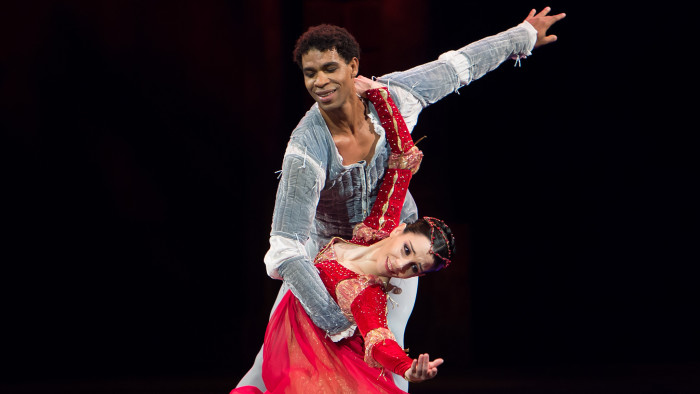Romeo and Juliet, Royal Albert Hall, London – review

Simply sign up to the Life & Arts myFT Digest -- delivered directly to your inbox.
Many critics turned up their noses at Derek Deane’s in-the-round production of Romeo and Juliet when it premiered in 1998: too brash in tone, too vulgar-big, but it succeeds brilliantly on its own terms. The supersized ensembles are constantly realigned and the lovers’ duets swoon dizzily on their axis so that there are good views from all parts of the house – even the first kiss revolves.
English National Ballet’s 11-night Albert Hall season is unusually flush with stars – Alina Cojocaru, Elena Glurdjidze, Daria Klimentova, Vadim Muntagirov – but Wednesday’s opening was nabbed by player-manager Tamara Rojo. Her starry pairing with Carlos Acosta guaranteed a full house (and a standing ovation) although neither was on top form.
The youngest Juliets are not automatically the best: Fonteyn, Maximova, Ulanova and Makarova all danced Shakespeare’s 13-year-old heroine well into middle age. Rojo, 40 last month, has the face and physique of a teenager but in scorning the stock gestures of girlie gaucherie – the lowered eyes, the ducking head, the fidgety fingers – she gives us a much cooler, more assured Juliet than the impetuous adolescent she first created for Deane 16 years ago. Her long stage partnership with Acosta makes for some carefully polished but rather bloodless pas de deux with none of the reckless timing needed to make the love scenes soar.
Rumour has it that long-laid plans for an audience-building live cinema relay were scuppered when Acosta, star of many a DVD, suddenly became camera-shy. You see his point. A mature Juliet can still touch your heart but Romeo’s juicy youth is the direct physical equivalent of the play’s poetry. Acosta, who has announced his intention to retire in 2016, has understandably switched into energy-saving mode. There were flashes of the old bravura (pirouettes a speciality) but his partnering lacked heat and his acting was perfunctory.
There was plenty of strong support. Acosta’s nephew Yonah, making his debut as a lusty, heartbreaking Mercutio, interacted eagerly with friends and enemies. The busy second act can be surprisingly tedious but rampaging swordplay – a far cry from the careful pat-a-cake of the MacMillan version – and vivid character playing gave it real dramatic force. Jane Howarth’s Lady Capulet, catatonic with grief at the deaths of Tybalt and Juliet, deserves a tragic ballet in her own right.

Comments